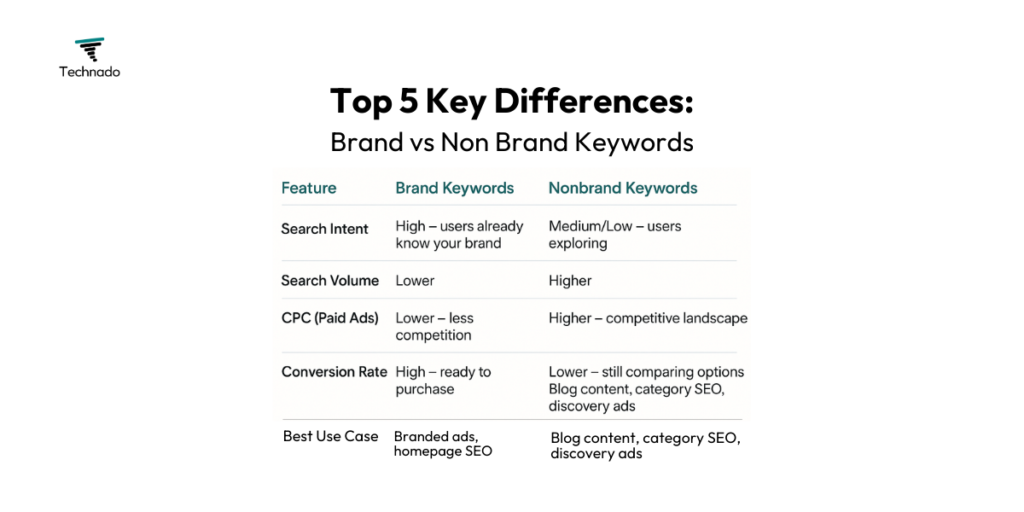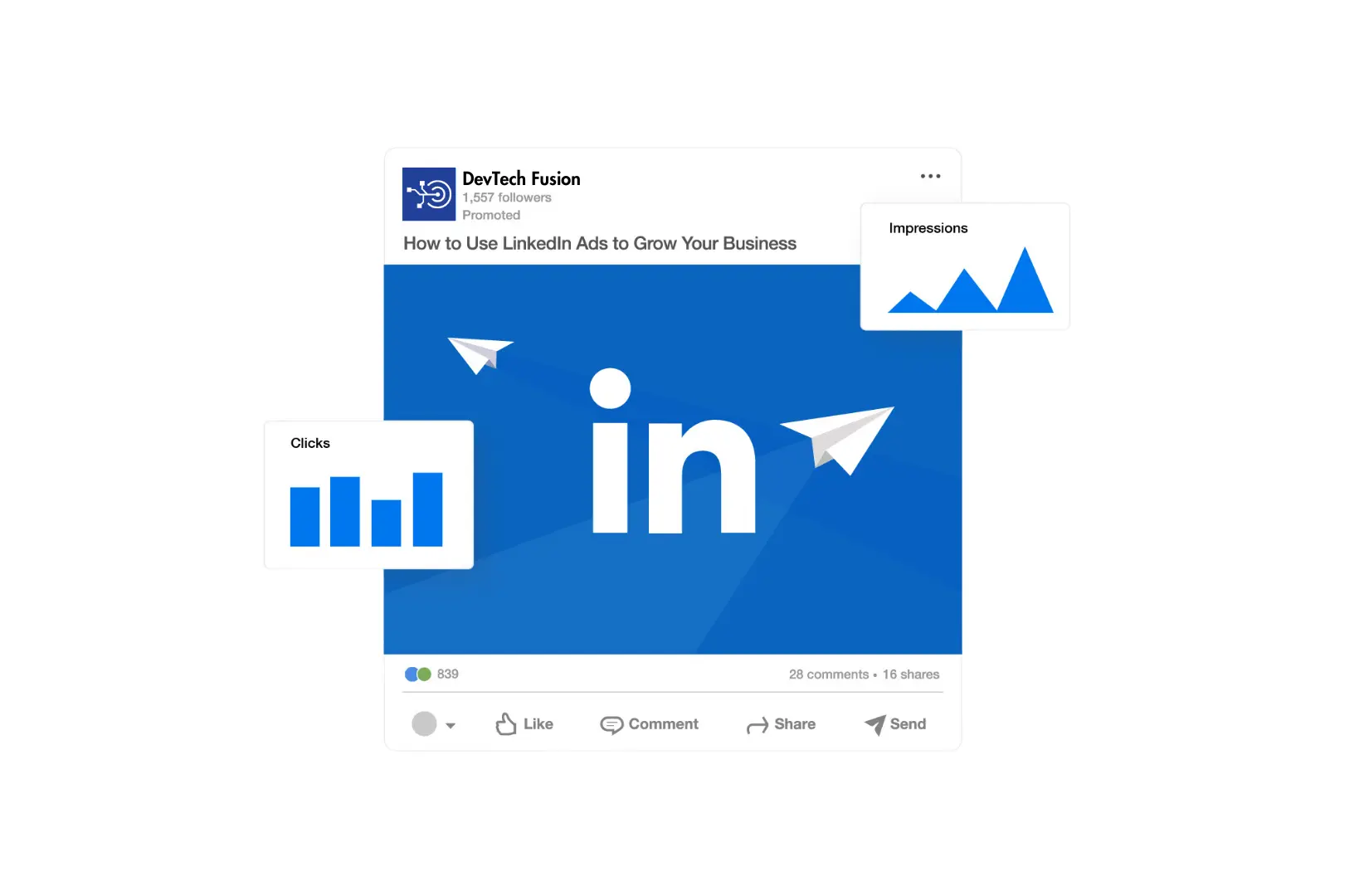In today’s dynamic digital marketing world, effectively using keywords can make or break your online presence. Among the many keyword types, brand and non-brand keywords are two essential categories that every business should understand and leverage. Brand keywords include your company’s name or product names (e.g., “Nike Air Max”), targeting users who already recognize your brand. Non-brand keywords, on the other hand, are broader terms (e.g., “best running shoes”) that attract new audiences unfamiliar with your business.
According to Google, brand keywords have a 2x higher conversion rate than non-brand keywords. However, over 70% of search traffic comes from non-branded queries, making them critical for discovery and growth. By balancing both, businesses can capture traffic across all stages of the customer journey — from awareness to purchase. This strategy boosts visibility, nurtures loyalty, and keeps your brand competitive in the evolving search landscape of 2025 and beyond.
What Are Brand Keywords?
Brand keywords are search terms that include your brand name or a close variation of it. These keywords are used by people who are already aware of your business and are actively seeking your products, services, or website. They signal existing interest or loyalty, which often results in higher conversion rates. Brand keywords can be broad, such as “Nike shoes” or “Apple MacBook,” or more specific and detailed, like “Nike Air Max 2025” or “Apple iPhone 14 case.” They may also include branded product lines, slogans, or even misspellings and acronyms related to your brand. Targeting brand keywords helps ensure that when someone searches for you, they find the right information and don’t get diverted to competitors.
Examples of Brand Keywords:
- “Coca-Cola”
- “Tesla Model S”
- “Nike Air Force 1”
What Are Non-Brand Keywords?
Non-brand keywords are search terms that don’t include your brand name but are still highly relevant to your products, services, or industry. These keywords are typically used by people who are in the discovery or research stage of the buying process and may not yet be familiar with your brand. Instead of searching for a specific company, they’re looking for solutions to their needs, like “best wireless headphones,” “affordable running shoes,” or “how to improve website SEO.” Targeting non-brand keywords helps attract new audiences, increase organic visibility, and build brand awareness. While they may have lower conversion rates initially, they play a crucial role in expanding reach, driving top-of-funnel traffic, and bringing potential customers into your sales funnel.
Examples of Non-Brand Keywords:
- “Best running shoes for flat feet”
- “Electric vehicles for families”
- “Affordable wireless headphones”
Why Are Brand Keywords Important?
Brand keywords indicate that users are already familiar with your brand and are intentionally searching for it. Whether it’s your company name, a product line, or a specific branded item, these searches show a strong level of brand awareness and intent. Since the user already knows you, there’s less friction in the buying process — leading to higher click-through and conversion rates. In fact, studies show that branded keywords often convert twice as well as non-branded ones. This is because users searching brand terms usually trust your brand, are further along in the buyer journey, and are more likely to take action. In short, brand keywords reflect customer loyalty and play a key role in reinforcing retention and repeat business.
The primary benefits of focusing on brand keywords include:
- Higher click-through rates (CTR): Since the searcher is specifically looking for your brand, they’re more likely to click on your website.
- Increased trust: Brand keywords are a clear signal that people trust and recognize your brand.
- Control over the narrative: Focusing on brand keywords allows you to control the conversation around your brand and product offerings.

Why Are Non-Brand Keywords Important?
While brand keywords are crucial for capturing customers who already know and trust your business, non-brand keywords play an equally important role in expanding your reach. These keywords allow you to tap into a much broader audience — people who may not have heard of your brand yet but are actively searching for solutions, products, or services that you offer. Think of non-brand keywords as a way to cast a wider net and attract users at the top of the marketing funnel, where awareness and discovery happen.
By targeting relevant non-brand keywords, businesses can drive valuable organic traffic from potential customers in the early research phase. These searchers are exploring options, comparing providers, and gathering information before making a decision. Ranking well for non-brand search terms helps position your business as a trusted resource in your niche, build brand awareness, and generate new leads, even in highly competitive industries where brand recognition isn’t yet established.
The benefits of non-brand keywords include:
- Increased visibility: By targeting high-volume, non-brand keywords, you can appear in search results where your brand isn’t already a recognized name.
- Lead generation: These keywords can help bring in fresh leads, especially those still exploring options in your industry.
- Building brand awareness: Non-brand keywords can be the first step in introducing new customers to your brand and building trust over time.
Brand vs Non-Brand Keywords: Where Should You Focus?
In 2025, it’s essential to strike a balance between brand and non-brand keywords to create a well-rounded SEO strategy. Both keyword types serve distinct purposes and play key roles at different stages of the customer journey. Brand keywords focus on capturing existing customers who are already familiar with your brand, leading to higher conversion rates and fostering customer loyalty. On the other hand, non-brand keywords target new potential customers who are still in the research or discovery phase. These keywords help increase your brand’s visibility, attract fresh traffic, and introduce your business to people who may not have known about you before.
By optimizing for both brand and non-brand keywords, businesses can ensure they reach the broadest audience possible, from those ready to make a purchase to those just starting their buying journey. A balanced strategy helps increase organic traffic, build brand awareness, and ultimately drive long-term growth.
- Brand Keywords:
If your brand is well-established or you’re focusing on customer retention, brand keywords should be a top priority. These keywords are critical for ensuring your loyal customers can easily find you and engage with your content. By optimizing for brand-specific terms (like your company name or product line), you make it easier for existing customers to return and convert. Brand keywords help reinforce trust and loyalty, ultimately contributing to long-term relationships with your audience. This focus also aids in protecting your brand’s online presence, ensuring that your customers are directed to your website rather than competitors when searching for your products or services.
- Non-Brand Keywords:
If your goal is to expand your audience or break into new markets, non-brand keywords should play a vital role in your strategy. These keywords allow you to reach individuals who may not yet be familiar with your brand but are searching for solutions to their needs. By targeting non-brand keywords, you can attract new leads, increase visibility, and build awareness in untapped markets.
How to Optimize for Both Types of Keywords
- For Brand Keywords:
- Ensure your website’s homepage is optimized for your brand name and variations.
- Use your brand name in meta tags, image alt-text, and URLs.
- Monitor branded searches to see how people perceive your brand and adjust your content accordingly.
- For Non-Brand Keywords:
- Focus on creating high-quality, informative content targeting long-tail keywords.
- Use SEO tools to identify non-brand keywords with high search volume and low competition.
- Optimize for user intent by understanding what information, products, or services people are looking for.
Final Thoughts
Both brand and non-brand keywords are essential to a successful digital marketing strategy. While brand keywords help nurture relationships with your existing customers, ensuring they can easily find you and engage with your content, non-brand keywords are crucial for opening the door to new leads and market opportunities. By targeting non-brand terms, you can attract fresh traffic and build brand awareness among audiences who may not yet know your company. A balanced approach to both keyword types ensures your brand remains visible at every stage of the buyer’s journey, from awareness to conversion.
As SEO continues to evolve, it’s important to consistently monitor how these keywords perform and adjust your strategy based on shifting trends and business goals. By effectively mastering both brand and non-brand keywords, you’ll improve your reach, drive relevant traffic, and position your brand for long-term success, growth, and increased conversions in 2025 and beyond.
Suggested Reads
DigitalOcean Expands to Pakistan – New HQ at COLABS
Manus Isn’t China’s Second ‘DeepSeek Moment’—Here’s Why
Google Pay Launches in Pakistan: A Game Changer for Digital Payments

Burhan Ahmad is a Senior Content Editor at Technado, with a strong focus on tech, software development, cybersecurity, and digital marketing. He has previously contributed to leading digital platforms, delivering insightful content in these areas.








